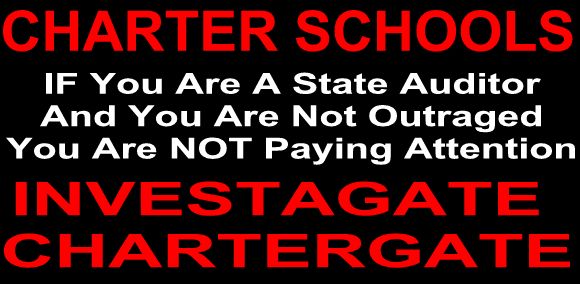U.S. Department of Education Fails Utterly In Its Responsibility to Oversee Charter School Sector

On Saturday, the Washington Post‘s Emma Brown reported that Carl Paladino, a Buffalo, NY real estate developer and surrogate for Republican presidential candidate Donald Trump, went to the annual meeting of the Council for the Great City Schools and told the leaders of the nation’s largest school districts that a President Donald Trump, “would seek to do away with ‘corrupted, incompetent’ public school systems in America’s cities, replacing them with charter schools and vouchers for private schools. Such an approach would ‘encourage competition in the marketplace and eventually dismantle the corrupted, incompetent urban school districts that we have in America today.'” One can imagine that—while such words would impress Jeb Bush and others who love vouchers and would please Arne Duncan and our current Secretary of Education John King, who have promoted of the explosive growth of charter schools—Paladino and Trump’s market-based vision of education was poorly received in a room filled with big city school superintendents.
While we can hope that after November 8, we will not have to take seriously the threats of Donald Trump, attacks on government and prescriptions for privatization remain at the center of our political rhetoric. These days market-based education strategies dominate the public policy of both political parties.
In their recent book, American Amnesia, Yale political scientist Jacob Hacker and Berkeley political scientist Paul Pierson remind us of what we have forgotten during the past forty years—the important role of government: “This book is about an uncomfortable truth: It takes government—a lot of government—for advanced societies to flourish. This truth is uncomfortable because Americans cherish freedom. Government is effective in part because it limits freedom—because, in the language of political philosophy, it exercises legitimate coercion… We live in an era of profound skepticism about government. Contemporary political discourse portrays liberty and coercion as locked in ceaseless conflict. We are told that government is about ‘redistribution’ and the private sector about ‘production,’ as if government only reshuffles the economic deck rather than holding many of the highest cards… We suffer, in short, from a kind of mass historical forgetting, a distinctively ‘American Amnesia.'” (p. 1-2)
While Hacker and Pierson’s book does not examine the history of the vast privatization of education that has expanded right along with attacks on government more generally, the lessons of this profound book speak directly to many of the problems with school choice. For example, Hacker and Pierson explain, while modern societies are complex, the market fails to inform citizens accurately and adequately: “(W)here informational demands are high, the sources of market failure grow.” Behavioral economics has identified the problem of “consumer myopia,” a widespread inability of people to discern their own best interests—and something that the marketers of charter schools know how to manipulate as parents look for schools: “We are easily distracted by shiny objects and thus vulnerable to being ‘primed’ to attend to particular aspects of a choice situation… We are overconfident, typically expecting our own experience to be better than average… We are biased toward avoiding losses rather than achieving gains. We are very bad at assessing risks… We are prone to inertia.” (p. 81)
How should we expect government to correct for this widespread problem? “In a culture that U.S. Department of Education Fails Utterly In Its Responsibility to Oversee Charter School Sector | janresseger:

